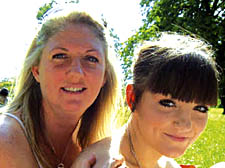|
|
 |
| |

Toni Scoullar pictured with daughter Beckie who died earlier this year |
Daughter’s death was avoidable, says Mum
Earlier tests on her older brother’s chronic symptoms ‘could have saved Beckie’s life’
THE mother of an 18-year-old trainee beautician who died suddenly from a rare heart problem says that earlier tests on her son might have saved her daughter’s life.
Toni Scoullar, 40, only discovered on Friday that her son, Bradley, is also at risk from Sudden Arrhythmic Death Syndrome (SADS) and has the tell-tale signs of the genetic condition which led to the death of his sister Rebekah in February.
Whereas Rebekah had shown few symptoms prior to her death, Bradley, 22, had suffered since childhood from blackouts and seizures – symptoms of SADS – but he was incorrectly diagnosed as epileptic.
Last year the National Hospital for Neurology and Neurosurgery in Queen Square, Bloomsbury, finally ruled out epilepsy and instead identified the problem as a heart abnormality but no further testing was carried out – until after Rebekah’s death
Mrs Scoullar’s own mother died at a young age and she is angry that Rebekah, known as “Beckie”, was not assessed before she died.
Beckie, 18, was found dead in her bed at the family’s Camden Town home.
An inquest last week heard how the condition, which creates an abnormality of the heart’s electrical signals causing it to beat irregularly, can be treated with beta blockers and pacemakers.
Mrs Scoullar, of Lyme Street, said: “I don’t want to blame anyone, but I do feel really angry and frustrated. If we’d have known, Beckie would still be here, and all we have is just sad news.
“If Bradley had been tested properly and they’d found it wasn’t epilepsy and it was his heart, we’d all have a different life now.”
She is now calling for a national testing system to be set up for the families of anyone who dies suddenly at a young age.
Mrs Scoullar’s mother died in 1974 at the age of 24. She believes too little is known about the condition, which kills roughly 500 young people each year.
Just a fraction of the British Heart Foundation’s research goes into rhythmic abnormalities of the heart, with most going towards coronary problems.
Mrs Scoullar’s grandson Theo, aged 11 months, is being tested to see if he is at risk.
She said: “It’s so devastating to lose a beautiful bright girl, but then to realise that we’re all at risk and there’s this condition that Rebekah had that we may all have – it’s turned our lives around.
“Although ignorance is bliss, the knowledge is necessary to prevent my living surviving children from sudden death.” |
 |
|
|
 |
| |
| |
|
 |
|